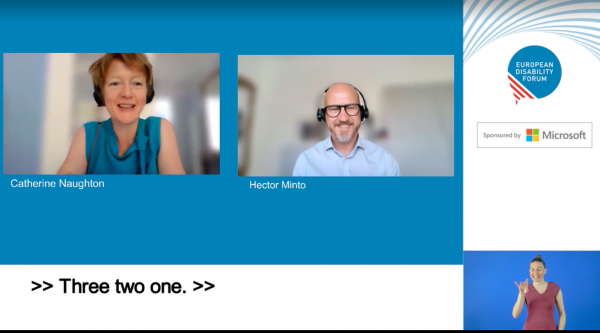The beginning of June was marked by the summer arriving in Brussels and a two-day European Accessibility Summit, which EDF (European Disability Forum) organised with the support of Microsoft and the participation of speakers from the European Commission, the International Labour Organisation, Disabled Persons Organisations and a range of businesses and business representatives.
Since the COVID 19 pandemic, remote working and learning has soared in Europe and around the world. Digitalisation has penetrated all workplaces and learning spaces – in our Summit we asked – what does this mean for persons with disabilities and how do we make the future of work inclusive?
The online Summit was framed at the opening by EDFs president, Yannis Vardakastanis. In welcoming participants, he recalled that when it comes to information and communication technologies, our goal is to ensure that these technologies are available, affordable, and accessible for persons with disabilities.
Mr Vardakastanis underlined the impact of COVID19 as an accelerator of digitisation and pointed out that it is an unmissable opportunity ensure no one is left behind.
He noted that even though EU (European Union) Employment Equality Directive prohibits discrimination in employment and vocational training on the grounds of disability, the latest EU figures on the employment rates of persons with disabilities showed that on average, only 50.8% of persons with disabilities were in employment, compared to 74.8% for persons without disabilities.
Therefore, EDF President emphasized the role of the new European Disability Rights Strategy Europe which contains flagship initiatives aiming at improving employment outcomes for persons with disabilities.
The first ever European Commissioner for Equality, Helena Dalli made an opening address which outlined her vision for an inclusive and accessible Europe. She highlighted employment as a key element of the Disability Rights Strategy, and accessibility at the core to guarantee the inclusion of persons with disabilities.
The Commissioner focused on three themes of the new strategy: accessibility, employment, and skills. Regarding accessibility, she highlighted the launch of the resource centre “AccessibleEU” a place to share good practices and to inspire policy developments. It will support the development of tools, standards, and support member states in the implementation of accessibility.
She said that the EU is working to improve employment rates among persons with disabilities in Europe. She recalled that the Employment Equality Directive contributes significantly to promoting equal rights of persons with disabilities in the labour market, including via the provision of reasonable accommodations.
Commissioner Dalli concluded her remarks by saying that having the right skills is a prerequisite to access and succeed in the labour market and so the EU is calling on Member States to ensure inclusive and accessible vocational education and training programmes.
This event aimed to bring together many partners who play a role in digitalisation, accessibility, and the future of work, so it was useful to have the chance to hear from Vice President of European Government Affairs, Microsoft, Casper Klynge.
Mr Klynge started the keynote address highlighting that many persons with disabilities have lost their jobs because of lockdown and the difficulties of teleworking, including lack of necessary resources, support, digital skills, and accessible digital infrastructure. He expressed hope for Europe’s economic recovery to be inclusive and accessible, with the European Resilience & Recovery Facility, as an historic opportunity to build back better. Mr Klynge acknowledged Europe’s aspirations and the EU’s ambitious digital agenda and recent EU Disability Strategy. He highlighted that to make Europe fit for the digital age, we need to make technology fit for Europe. The collaboration on this journey will continue to make a technology that is accessible and inclusive.
He highlighted Microsoft’s commitment to disability inclusion as a key part of their organisational culture. He believes that there are opportunities to share learning as well as challenges and to promote accessible technology and help the way we work and do business.
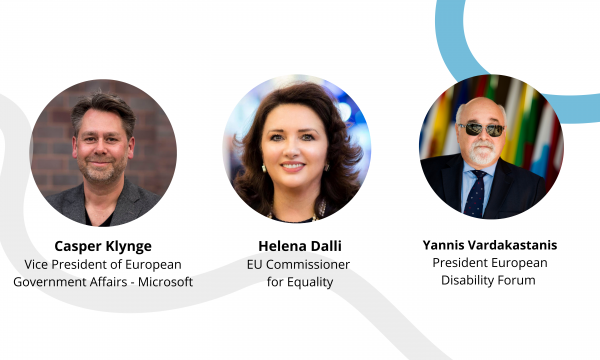
Employees stories
A highlight of day 1 of the European Accessibility Summit was an employee panel – which brought together a range of staff working in provide companies who spoke of their experience of workplace inclusion.
The first session focused on employees’ stories. Kate Nash, CEO (Chief Executive Officer), PurpleSpace led the conversation asking questions to the three panelists: Bianca Prins, Global Head of Accessibility, ING, Arthur Manders, Strategy & Integration Advisor, Shell Inc. and Michael Vermeersch, Digital Inclusion Lead, Microsoft.
Ms Nash stated that “Building a better and more accessible digital working world for employees requires us to courageously share our stories of disability and difference. Those organisations who are doing well in digital inclusion are those who routinely chose to learn directly from their own people and most often via the establishment of disability employee resource groups/ networks.”
During this session, the panelists shared their own experience as employees. They shared their views and experience of adequate workspaces and accessible technology and how creating this kind of environment is win-win. It empowers employees and also allows them to reach their full potential. It also reaps rewards for their companies who get the full benefit of their commitment, innovation, and talent.
After this roundtable summit attendees were able to choose to join different breakout rooms that addressed specific topics.
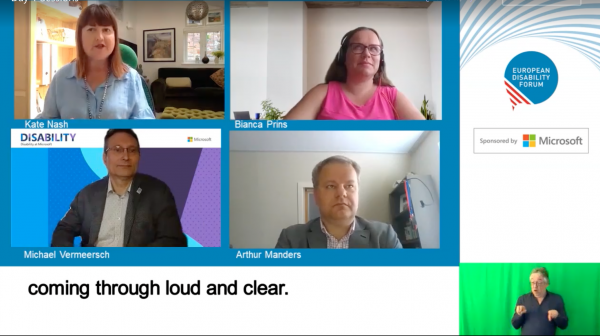
Accessibility and banking
Moderator Bianca Prins, Global Head of Accessibility, ING introduced the speakers of the first breakout, focused on the implementation of accessibility systems and solutions in banking. Gerry Ellis, FeelthebenefIT, Inka Ilona Taagehøj, Product Expert, Siteimprove, Peter Stolk, Digital Customer Specialist, De Volskbank Holland and Benjamin Sahel, Head of Employee Services Division, European Central Bank took the floor one after the other to present their contributions in a traditional ‘webinar style’.
Retail
At the same time moderator Susanna Kowatsch, Change Manager Western Europe at Microsoft introduced the speakers of the second breakout: John Carter, Senior Hub Manager, Microsoft, Nina Lund, Retail Industry Lead EMEA, Microsoft, Nathalie De Greve, Director of Sustainability, Comeos and Claus Bergman Hansen, Head, Klapjobs. KLAPjobs main purpose is to establish jobs on the ordinary labour market for people with intellectual disability.
The panelists discussed retail accessibility and its implementation for customers. For instance, pre-pandemic we had not considered fully the importance of food retailers as an inclusive accessible essential service. Once the pandemic hit, people with disabilities have been left behind until retailers took an active approach on accessibility e.g.: specific opening hours for people with disabilities, services for people with Autism etc.- this had a big positive impact. It was also important that government COVID 19 rules, which at first prohibited people with disabilities shopping with an assistant, but then, after advocacy from the disability movement and older people’s representatives, made exceptions to their rules to allow for people to shop with assistance where needed.
Mr Hansen pointed out while it is important to offer the right services it is even more important to hire people with disabilities to enable them to play a, active role in society by actively contributing to the economy. John Carten took an active approach himself, by hiring a diverse team of people with disabilities and gave insights into how he and his team learned from each other
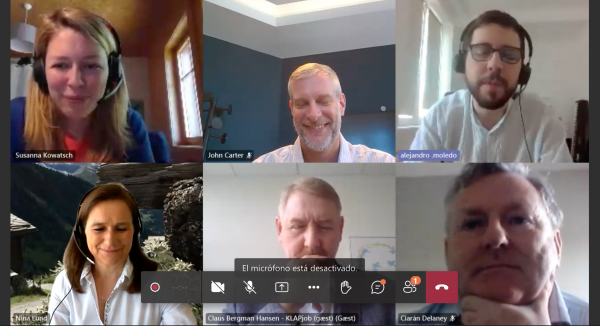
Transport and tourism
The last breakout session of the day was focused on accessibility in transportation and tourism. Attendees had the opportunity to see the progress and challenges in its implementation. This session was moderated by Hector Minto, Accessibility Evangelist, Microsoft who asked questions to the four participating panelists: Anat Caspi, Director of the Taskar Center for Accessible Technology, University of Washington (Recorded video interview), Patrick Stolpmann, Head of Technology and Transformation, International Paralympic Committee, Jesús Hernández Galán, Director of Universal Accessibility and Innovation, Fundación ONCE and Marie Denninghaus, Policy Coordinator, EDF.
“EU legislation has already brought a lot of improvements, for example with the Passengers’ Rights Regulations, but there are still too many gaps in terms of accessibility. Better enforcement and more ambitious legislation that also covers urban transport are needed.” Said Ms Denninghaus.
Day 2 of the summit was opened by EDFs Catherine Naughton and Hector Minto Accessibility Evangelist at Microsoft.
Mr Minto presented Microsoft’s accessibility strategy based on three pillars: affordable technology, talent development and inclusive workplace, highlighting that accessibility is about us all recognising the benefits that persons with disabilities bring to organisations.
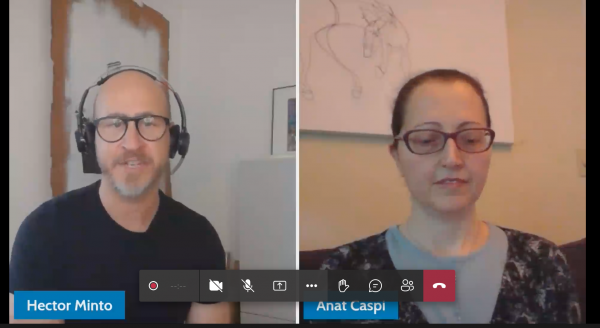
Interviewing Caroline Casey- Founder of the Valuable 500
Following the opening remarks Mr Minto started a conversation with Caroline Casey, Activist and Founder of The Valuable 500.
Ms Casey mentioned the importance of seeing accessibility as ‘an everyone issue’ not a disability issue. She emphasised that the business system can change if they want to, and in the Valuable 500 this focus is on leadership commitment and intention. She also underlined that we need to see more leaders with lived experience of disability, noting how underrepresented persons with disabilities are in the Boardroom.
That is why the Valuable 500 has become a global movement putting disability on the business leadership agenda.
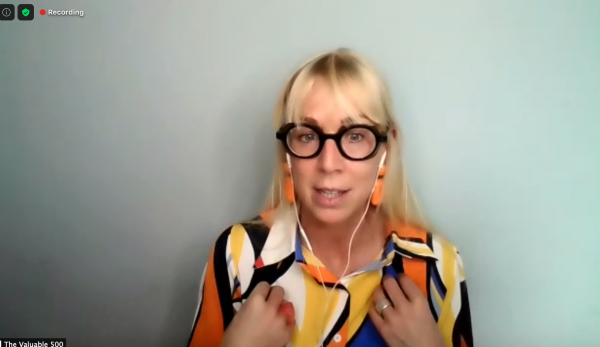
A conversation on accessibility in Europe with Microsoft’s Chief Accessible Officer, Jenny Lay-Flurrie
This conversation was followed by an interview with Jenny Lay-Flurrie, Chief Accessibility Officer, Microsoft conducted by Alejandro Moledo, Head of Policy at EDF.
During this brief conversation Alejandro asked a range of questions to Jenny concerning the importance of having a strategy, how to measure and monitor its implementation, and Microsoft’s ambition for Europe and persons with disabilities. They discussed the involvement of all stakeholders, the need to invest in skills, and the key role of leadership and representation of persons with disabilities at the workspace.
The importance to push hard on building a culture of sustainable accessibility that empowers persons with disabilities was a key feature of the discussion. Ms Lay-Flurrie remarked that there are many people with disabilities who are not receiving the support they need. She hopes to someday be able to see employment and education and graduate rates of persons with disabilities at the same as the general population. “When you empower disabled employees you get greater productivity, faster innovation and a better, inclusive organisation,” she said.
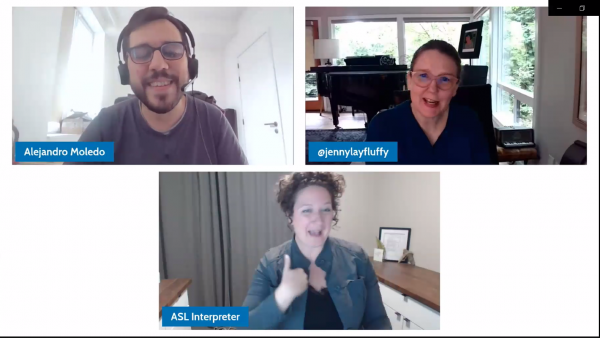
The Future of Work
Day 2 of our summit included a plenary panel discussion on the future of work, moderated by EDFs (European Disability Forum) Vice President, Pat Clarke.
The panel was designed to get the perspective of some of the important voices on the future of work, digitalisation and the EU’s role- speakers were Elise Hoekstra, Director Enterprise Channel Sales, Microsoft, Dragoș Pislaru MEP (Romania, Renew Europe), Neil Milliken, Head of Accessibility & Digital Inclusion, Atos and Stefan Trömel, Senior Disability Specialist, International Labor Organization.
Pat Clarke began by highlighting how important this topic is- he mentioned the low employment rates of persons with disabilities: just 50.8% of persons with disabilities are in employment compared to 75% of nondisabled people. Working life is also changing, and COVID-19 has fast tracked the shift to remote working and increasing use of digital platforms. This can be both an opportunity and a barrier when we think of employment of persons with disabilities.
Elise Hoekstra, Director Enterprise Channel Sales, Microsoft highlighted that this is not only about the ensuring the accessibility of technology but about inclusive workplace culture. Creating this inclusive culture should be intentional- she said that if you do not intentionally include, you end up excluding people. In this sense, staff with disabilities also play a key role.
Dragoș Pislaru MEP (Romania, Renew Europe), reiterated his support to the Disability Rights Strategy in Europe, and his commitment to making real change in his work as a member of the European Parliament. He reminded everyone of the fact that COVID 19 has had and is having a devastating impact on persons with disabilities, included in the field of employment. The future of work and digitalisation are intrinsically linked, and to ensure all citizens can benefit in this transformation they need the resources, they need the skills, and the technology needs to be accessible. While the pandemic has fast tracked us in this digital future, there are also risks that the digital divide will only increase.
Stefan Trömel, Senior Disability Specialist, International Labor Organization (ILO), highlighted that the future of work was already on the ILO’s radar and that the pandemic had indeed intensified the digital transformation. While it is impressive to see private companies taking steps to ensure an accessible online environment Mr Trömel reminded us that many people, including those working in the informal economy have not be able to work from home- they are often left jobless and without income or social protection.
Neil Milliken, Head of Accessibility & Digital Inclusion, Atos, began by mentioning that the disability community had campaigned for years for flexible working, and now COVID 19 has meant finally flexible working has become a reality for many employees. However, in reflecting the intervention from Mr Trömel he said that building inclusive education and ensuring skill building for persons with disabilities will give more access to a wider range of jobs.
Just like in the first day of our summit, attendees could choose to join breakout rooms focused on two important topics- Equal Access to Assistive Technology and Equality in Education.
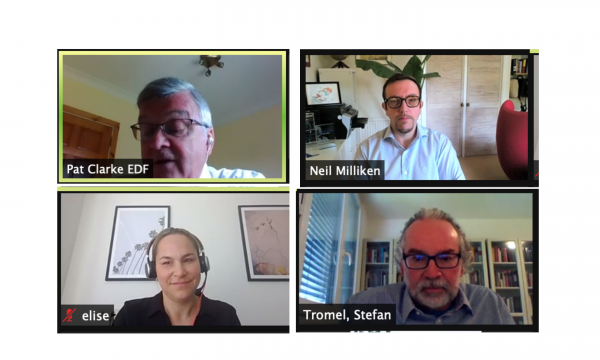
Equal Access to Assistive Technologies
This breakout session was moderated by Alejandro Moledo, Head of Policy at EDF, and the panellists included Ima Placencia Porrero, Senior Expert in the Disability and Inclusion unit of the European Commission, Christoph Müller, Board co-president of the Digital Assistive Technology Industry association DATEurope, Pedro Polson, CEO EMEA of HumanWare, and Tara Rudnicki, President of TobiiDynavox, both international Assistive Technology (AT) companies.
Mr Moledo introduced AT as the closest technologies to persons with disabilities and presented some of the barriers preventing persons with disabilities from fully benefiting from them: availability, affordability, lack of support in selecting, using, and maintaining AT, or interoperability issues with mainstream technologies. Ms Placencia Porrero began by giving an overview on what the EU has done concerning AT; whereas in the past the EU funded many projects on AT, more recently, it has made sure that there is a definition of AT in the Accessibility Act, and that there are binding requirements in the legislation to inform the users about the compatibility with mainstream technologies. Mr Muller explained the need to raise awareness among European countries on the current possibilities of digital AT, bearing in mind Europe’s diversity in terms of languages, for example. Mr Polson stressed that training should be at the heart of AT delivery, and recommended a pre-assessment of training needs as a first step. Ms Rudnicki touched upon one of the main barriers: affordability, and highlighted partnerships in the whole ecosystem as the key to lower prices.
In the second round of interventions, Ms Placencia Porrero was asked about the initiative in the European Disability Rights Strategy on evaluating the AT market in the EU by 2023. She answered that there is not a single AT market, as there are many different items when we refer to AT: there is the low-tech which market works well, but it gets more complex for high tech AT and more regulated products like medical devices (e.g. implants). Mr Muller answered one question from the audience concerning unaffordable prices of AT in Croatia. The representative of DATEurope expressed the need to channel funding so every person can access the most suitable piece of AT. Mr Polson expressed his view about the future of the AT industry, bearing in mind the increasing built-in accessibility features of mainstream technologies, for Humanware President, it is crucial that AT companies work closely with big tech companies. This final idea was echoed by Ms Rudnicki from TobiiDynavox which explained that any change by big tech affects AT companies, and therefore partnerships of the whole ecosystem are needed.
Equality in Education – every child deserves and education which is inclusive and equal
At the same time, the second breakout took place. The topic Equality in Education brought together in the same room Marcella Turner-Cmuchal, Project Manager, European Agency on Inclusive Education, Maureen Piggot, Inclusion Europe / EDF and Emma Nääs, Innovative Educator and it was moderated by Stina Biarsjo, Customer Success Manager, Accessibility, Microsoft.
Marcella Turner-Cmuchal highlighted that often inclusive education policies are in place, but that implementation is lagging. The question is how to support and foster the uptake, the implementation in transforming practice, and another is teacher training. The pandemic has obliged educational systems to use of digital technologies to provide education and training through remote learning, and this has shown the fracture lines of the digital divide very clearly.
Ms Turner-Cmuchal pointed out that what is good for learners with disabilities is benefitting all learners, so by being inclusive and accessible, general education is improving.
Maureen Piggot was asked about the benefits of inclusion, and she posed a question back- what if all left-handed children, or all first-born children, for example, were separated and segregated? She went on to reinforce the previous speakers points on diversity bringing advantages to all students by referring to research showing great educational attainment for non-disabled children win inclusive classrooms.
You can read more about Inclusive Education here: https://www.inclusion-europe.eu/education/
Emma Nääs, a teacher, talked about using technology to bring the world into her classroom, and to bring her classroom out into the world. She described the possibilities inclusive technology offered to students- to teach each other, to meet children around the world and to build skills for life.
Closing
For an inclusive and accessible Future of Work, part of the foundation is in place and some of the building bricks are ready.
Important part of this foundation includes the range of provisions in European law: the public procurement directive, the Directive on Accessibility of Public Sector Websites, and the European Accessibility Act. However, implementation and enforcement need continuous investment. Another foundational element is the newly adopted European Disability Rights Strategy, which outlines measures planned at the EU level or the next 9 years to improve implementation- such as the establishment of the new AccessibleEU centre.
We see persistently elevated levels of poverty and unemployment of persons with disabilities- so an accessible digital world also is a potential source of work for persons with disabilities- decent work is not just the right to do a job, but a springboard to economic empowerment and social inclusion. Persons with disabilities are users of digital technology, but in the future, we want to see more employees with disabilities, using accessible technology, within a diverse workforce in the tech industry, and across all industries.
It is clear from our discussions in the Summit that no one part of the ecosystem can solve this alone. Government and the public sector, disabled persons organisations, business- the tech industry- but also all other industries need to work together to make this inclusive digital world a reality.
The conference was closed by Hector Minto Accessibility Evangelista at Microsoft and EDF director Catherine Naughton. Hector reminded the audience about Microsoft’s Accessibility Commitment, which brings together a new raft of initiatives from Microsoft to bridge the digital divide. Catherine highlighted the importance to continuing this process, and this engagement, and our commitment to reach more partners to continue the conversation in future Summits.
